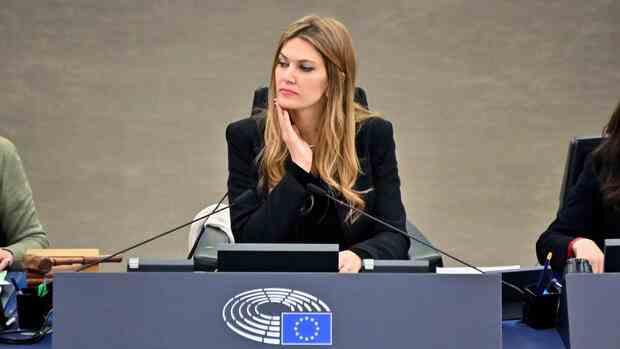Has the Vice President of the European Parliament received a bribe from Qatar?
(Photo: IMAGO/Panama Pictures)
The European Parliament has less power than the other EU institutions, but it stands out for its democratic legitimacy. The MEPs stand for election and seek the trust of Europeans. This trust is now at stake: a serious suspicion of corruption in parliament threatens to damage the reputation of the institution in the long term.
Eva Kaili, recently appointed one of the parliament’s vice-presidents, has been arrested. She is apparently part of a network that represented the interests of the Emirate of Qatar rather than the citizens in Brussels. The Belgian investigators seized 600,000 euros in apartments and offices, there is a suspicion that it is a bribe.
Kaili seems to have been a good investment: the Greek has emerged as a vehement advocate for Qatar, defended the emirate against allegations by human rights activists and advocated lifting the visa requirement for Qataris.
Can European politics be bought? This question alone shows what disastrous effects the affair could have. There is already talk of “Qatargate” in Brussels – based on the Watergate scandal in Washington in the 1970s. It is feared that more cases will come to light in the coming weeks. After all, Qatar is not the only one interested in influencing EU decisions.
Top jobs of the day
Find the best jobs now and
be notified by email.
The EU Parliament actually sees itself as a pioneer against bribery and corruptibility. For years, MEPs have been demanding that the Union take action against kleptocrats in its own ranks – especially against Hungarian Prime Minister Viktor Orban, who undermines the rule of law and cultivates favoritism.
>> Read also: Frustration in Hungary – “The government attacks all companies that don’t have legs to run away”
Just now, when the Commission is finally acting and blocking the payment of funds from the EU budget and the Corona recovery fund to Hungary due to a lack of rule of law standards, the corruption case is shaking Brussels. Orban will find it easy to portray his critics as hypocrites. He could be the big beneficiary of the affair. That must not happen.
Reforms must increase transparency and control at the EU Parliament
It was right that Parliament insisted on declaring war on Orban’s corrupt system of rule. The Commission and member states have watched the erosion of checks and balances in Hungary for far too long – and would probably still do so without pressure from MEPs.
But that also means that Parliament must be measured by its own high moral standards. Therefore, it is not enough to disempower Kaili. What is needed is an institutional reform that makes it clear that the EU, unlike the Hungarian government and other people who despise the rule of law, is willing to learn and change.
The transparency rules are already strict, and parliamentarians have to indicate which lobbyists they are meeting with. However, there are gaps in contacts with third countries that need to be closed.
The proposal to set up an independent EU ethics committee must also be implemented quickly. The Commission should have already worked out the concept for this, but the project has been delayed. Most recently, it became apparent that the body should not be given any comprehensive investigative powers. That would weaken it from the start.
It can not go on like this. The EU, already criticized by its opponents as arrogant and aloof, must not give the impression that it uses double standards in the fight against corruption. She must be a role model for transparency, not a latecomer. Otherwise, it runs the risk of losing what underlies all its powers: its legitimacy.
More: Orban blocks where he can – the EU partners are outraged
